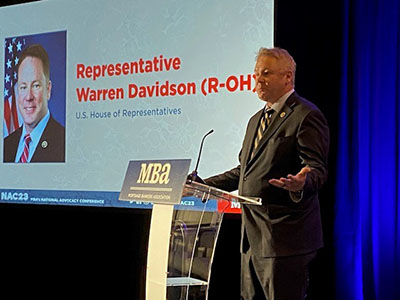
#NAC23: Lessons from the COVID Pandemic

(Rep. Warren Davidson, R-Ohio, speaks at the MBA National Advocacy Conference.)
WASHINGTON, D.C.–The Federal Reserve’s intervention when COVID hit the economy in March 2020 prevented massive damage to the markets, but the Fed should have stepped back after that, Rep. Warren Davidson, R-Ohio, said here at the MBA National Advocacy Conference.
Davidson, a senior member of the House Financial Services Committee, chairs the Subcommittee on Housing and Insurance. He spoke to MBA members Tuesday before their advocacy visits to Capitol Hill on Wednesday.
“Without the Fed there is no buy side of the market,” Davidson said. “In the last two weeks of March 2020 the Fed intervened and truly prevented massive collateral damage to the markets. Markets only function when there is some price discovery between buyers and sellers, so when there is no buy side at any price, you can’t have price discovery.”
Davidson noted anything in the structured credit market, whether residential or commercial mortgage-backed securities, was in “free fall” when COVID first hit. “When the Fed intervened to create a buy side and a backstop, markets started to function again,” he said. “But the Fed should have backed off at that point. Instead, they stayed involved and they are still involved in buying Treasuries and mortgage-backed securities. That raises the price of these securities, and that’s at odds with my job of making housing more affordable.”
Soft landings are “really rare,” Davidson said. “It can be done, but usually things crash much harder. And historically the Fed has struggled to pull off soft landings. I’m rooting for it to do so, but I think this was avoidable.”
Historically, the economy sees inflation until short-term interest rates exceed the inflation rate, Davidson noted. “Now, short-term rates are nearly at the inflation rate,” he said. “We should be able to get this under control and maybe we will succeed in a soft landing.” He noted 6.8% mortgage rates effected the market, “but it’s surprising how well demand has held up not just for housing but for a lot of things,” he said. “So think back to 2020: once the Fed got market stability, it should have let the market set rates instead of themselves holding rates low. They should have backed off.”
Asked about the proper federal role for housing, Davidson called it a three-step process. “First, make markets function,” he said. “Second, make markets function in a way that is non-discriminatory and protects civil liberties. Third, you need to do studies that ask if we are actually making markets function well and adequately protecting civil liberties.”
